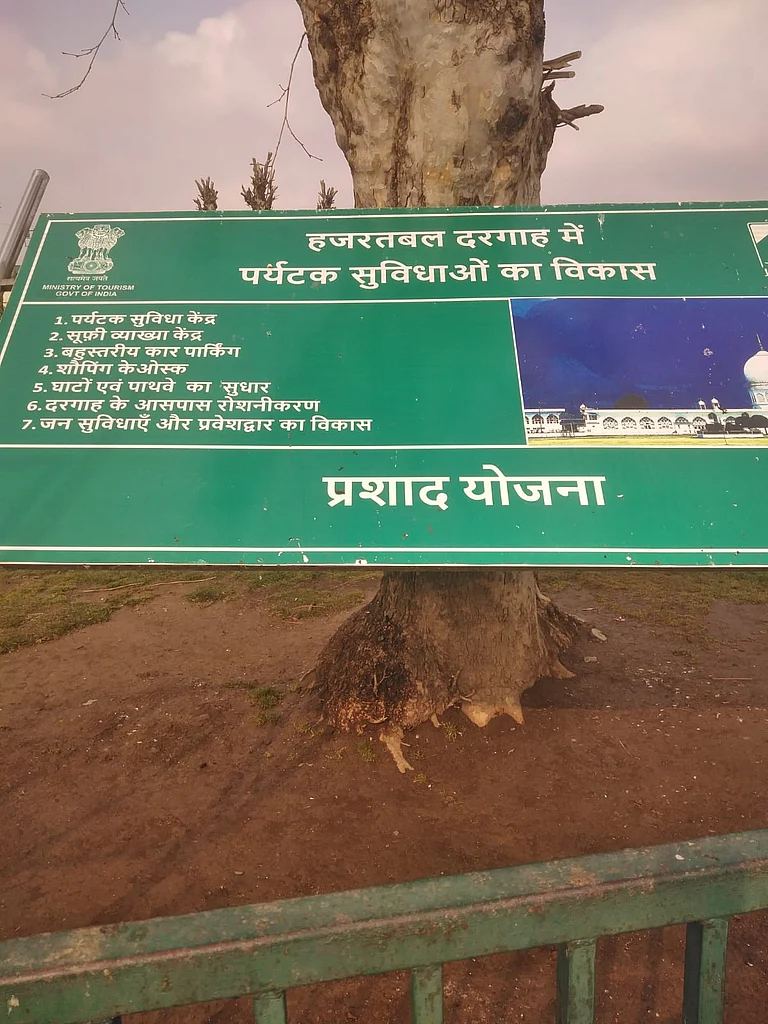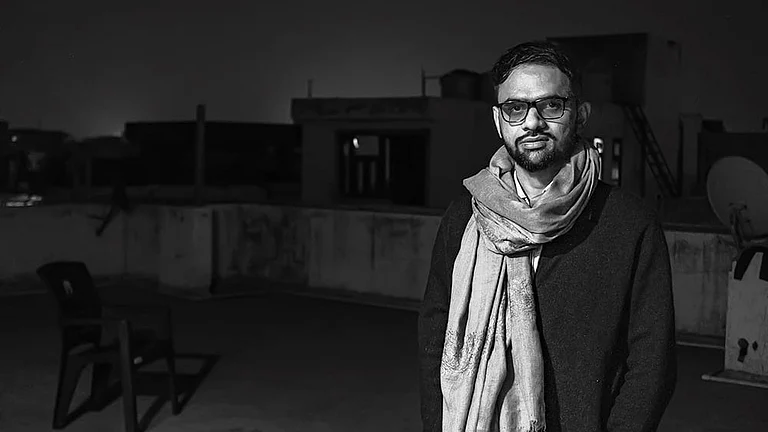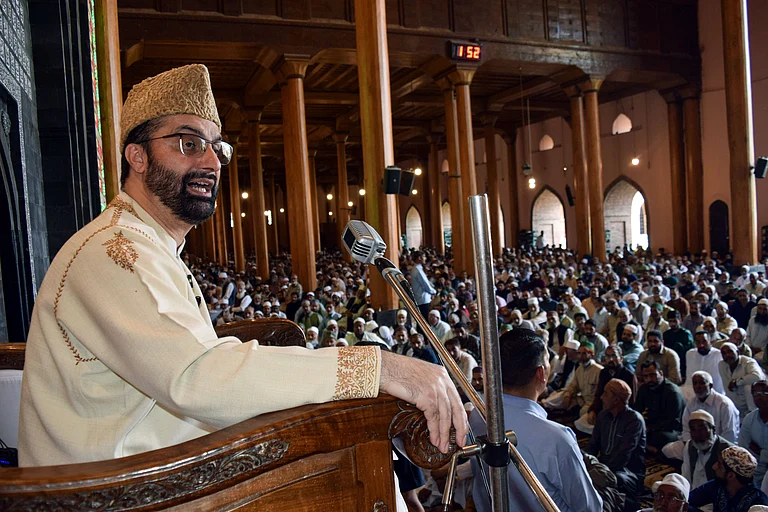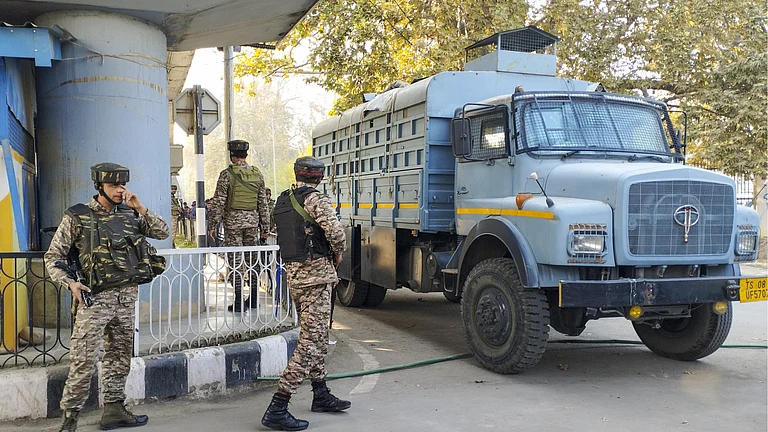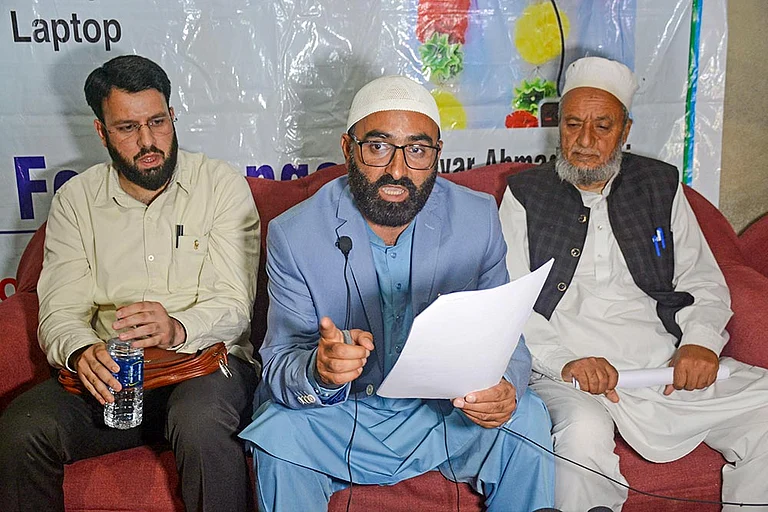Amidst the Assembly polls in Jammu and Kashmir, Mirwaiz Umar Farooq has said that he is not being allowed to move out of his residence in Srinagar after September 2. This comes at a time when the Lieutenant Governor Manoj Sinha-led administration has been repeatedly maintaining that Mirwaiz is a “free man”.
Outlook reached out to Mirwaiz to talk to him in detail about the Kashmir situation post August 5, 2019, elections, his detention, and Hurriyat’s discourse in the present situation.
Is the Kashmir issue still relevant?
If you are asking is it relevant to the people of Kashmir, my answer is: as long as their political sentiment and the desire to express it is alive, it is relevant. If you are asking internationally, as long as a part of J&K is in India, a part of it in Pakistan and some part of it with China (especially post 2019 ), while the first two countries of India and Pakistan claim it in totality, it is very much an alive and kicking issue. Besides, international resolutions and bilateral agreements between India and Pakistan on its resolution are a reality of the existence of the issue.
Where does your conglomerate stand as of now?
As long as the sentiment is there, the need to address it is there, Hurriyat Conference is there. It’s the representative forum seeking engagement with the sentiment for resolution through dialogue. We have always welcomed and supported every effort at it, right from Vajpayeeji to Manmohan Singhji to even Modiji. When he came to power in 2014, we reached out to him through media for engagement. Generations of Kashmiris have got wasted for want of resolution, for want of political engagement with their aspirations and sentiments which instead are repudiated by apathy and force.
The BJP-led government at the Centre is saying that post 2019, the situation in Kashmir has improved as there are no street protests now. How do you see this?
Jammu & Kashmir was made a Union Territory after the J&K Reorganisation Act, disempowered from defining its permanent residents and their rights, as was guaranteed under Article 35A. People see 2019 unilateral drastic changes of downgrading it to a UT, bifurcation of Ladakh from J&K, disempowerment from defining its permanent residents and their rights guaranteed under Article 35A, the Reorganisation Act and other diktats such as dismissals from government service, attachment of properties of locals, incarceration of political leaders and activists, continued daily arrests, the opening up of land, jobs and resources to outsiders, the complete crackdown on local press forced to become government mouthpieces, ire of authorities on any expression of dissenting opinion on any physical or social media platform, total black out of Hurriyat’s views in vernacular and regional press: all this as a shock therapy to insult their identity and cultural autonomy, to disempower them and engineer a long term demographic change in the Muslim majority region.
How do you read this? Will there be a reaction?
You may not see active turmoil as before 2019 but there is a strong latent/dormant resistance to all this. It is because of fear of repercussions, coercion and intimidation by the state, that people are self-censoring and not expressing themselves in the open. We have been silenced and silence does not mean agreement.
When was the last time Hurriyat Conference held its joint meeting. Are you trying to sort of rejuvenate it?
July 2019 was the last time we met together. On 4 August 2019 when thousands of people including leadership were arrested, I was detained at home. After a long period of four and a half years and going to the court I was released in September 2023. But since then too I am being detained for most of the time at home. Even when I am not under arrest I cannot move freely without informing the authorities every time before I leave home. Right now after the elections were announced, I was again put under house arrest.
How hard has been life under house detention been for you?
A difficult phase in life obviously, which more or less still continues. No human would like to lose his freedom and liberty.
What has been the most difficult phase of your detention?
The most difficult part of incarceration is not being allowed to go to Jamia Masjid on Fridays to deliver the sermon, a tradition followed by my ancestors for centuries as Mirwaiz and offer Friday prayers there. Even at the tragic time when my father was martyred and I was just 16 and became the next Mirwaiz, I would ascend the pulpit and just recite some basic Quranic verses, as I was too young and not trained in the ways of the Mirwaiz , because an empty pulpit was too painful for the tens of thousands of people who would habitually visit the historic mosque on Fridays to hear the Mirwaiz’s sermon and feel spiritually satisfied. So I knew that people would be greatly hurt by my absence and that caused me grief.
What is it like a routine day for Kashmir’s Mirwaiz in detention?
I spend most of my time reading. Also, strengthening my bond with the creator. Introspection and reflection to understand things in hindsight naturally happened. As physical and emotional health takes a hit in such situations, would exercise to fight the blues.
Who in your opinion are the stakeholders of Kashmir issue now?
The stakeholders of Kashmir issue primarily were and are the people of Jammu and Kashmir on both sides who are vacillating and living in uncertainty about their future. The conflict affects us the most. We have lost tens of thousands of our loved ones to it and thousands of our dear ones are languishing in jails. It’s about our aspirations, our will as the people of this land. It’s about the pain of the families divided across the Line of Control(LoC) since 1947 and post 1990 also about the suffering of the Kashmiri Pandit community that migrated. It is a human and a political issue begging resolution.
What’s your take on elections being held and their role?
Elections are the key to expression of civic choice in a democracy. But in J&K politics, it is way beyond just this exercise in governance. Hurriyat has always maintained that civic elections cannot be a means to conflict resolution. These are two separate matters. Regarding these elections even before being announced they were rendered meaningless after another amendment in the Reorganisation Act of 2019, giving broad and sweeping executive powers to the centrally appointed Lieutenant Governor, making the to be elected legislature almost powerless. This change was brought after an electoral gerrymandering during the delimitation exercise and adding more constituencies in one region of the state as against the other, to favour the electoral prospects of the ruling party. Besides these machinations there has been a concerted effort to fragment the electoral landscape of the Kashmir region and consolidate it in the Jammu region. It is extremely unfortunate that knowing all this, regional electoral parties, groups and individual candidates fell for it.
They could not even at this juncture stand up unitedly against the onslaught and help provide some relief to the affected people. Instead they put people in a quandary by standing up against each another, widening and deepening the divisions among people.
What role do you see for Hurriyat now?
Our focus is to ensure political engagement with the aspirations and sentiments of people and a closure to the conflict. Our role is clear, to work towards that end. And the best medium for that is peaceful means of dialogue and deliberation/mutual understanding and addressing of concerns and interests. We have always been ready and willing to reach out and engage. But in the current dispensation in New Delhi, so far there has been little appetite for such a thing. So we will have be patient, steadfast and persevere.
Has your stand regarding the Kashmir issue in view of the policies of the current dispensation in New Delhi impacted your life and your family’s?
As you know for last five years, I am mostly under house arrest and not allowed to move out much, so definitely it has impacted me in more ways than one. My religious and social obligations as the Mirwaiz are deeply affect.
Even my personal engagements such as attending family functions sad or happy ones is not in my control as I have to seek permission. There have been many attempts to publicly malign my reputation and discredit me through propaganda and even an FIR was recently filed against me by the anti-corruption bureau (ACB). Sadly my close relative, a senior state official known for his honesty and integrity was also accused in the FIR because of the relationship. Many of my family members including my spouse and little children are denied travel documentation.
As a result my wife who is an American citizen cannot visit her family residing in the US.
What keeps you motivated?
The trust and love of people for me and the consciousness of the long suffering of all the people of Jammu Kashmir for decades consuming our youth. I am really touched that despite the authorities stringent rules about me and knowing that it can put them in trouble, people stand by me and shower me with their selfless love and blessings . They are so happy to meet with me and invite me to their homes. Their resilience and faith in truth also inspires me. All this keeps me going.
(This appeared in the print as 'The Muscular Policy Worked')







